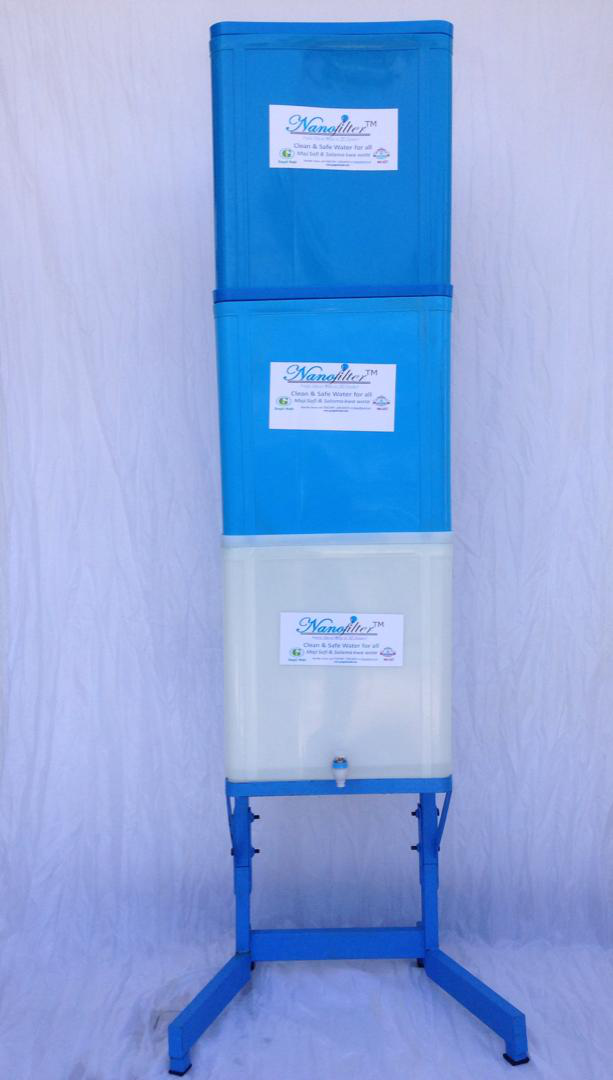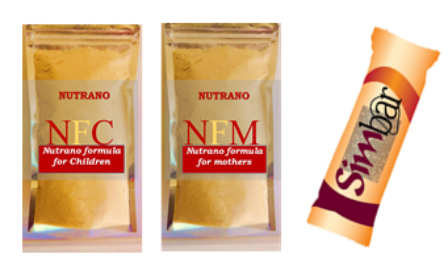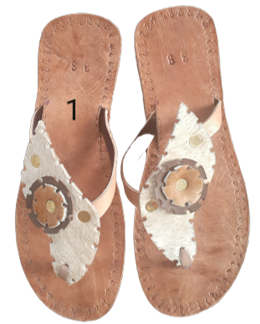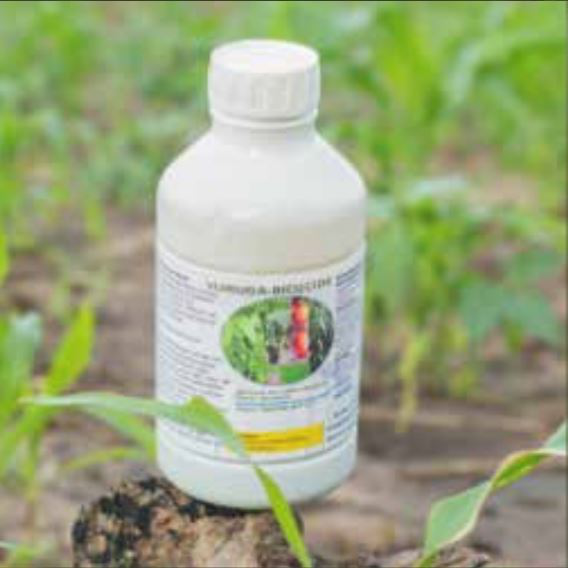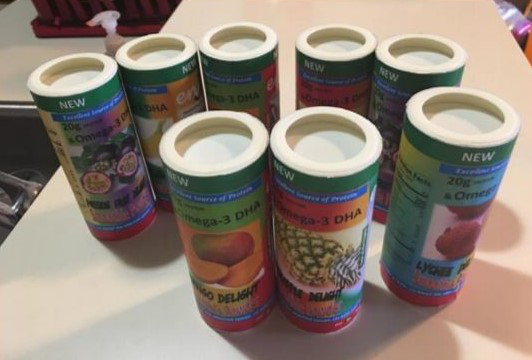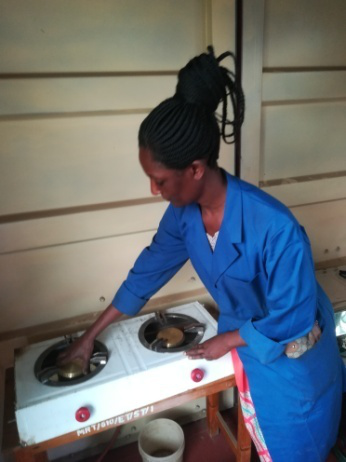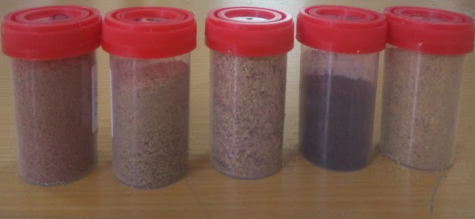Products in the Market
NanoFilter
Researchers: Isack Onoka (student) and Dr. Askwar Hilonga (school of MEWES)
Description: The NanoFilter is a 3-part filtration system capable of removing bacteria, microorganisms and harmful heavy metals. The first part of the filter is a slow sand filter which removes the microorganisms. The second part is patented and is acombination of nanomaterials made from sodium silicate and silver to eliminate toxic heavy metals such as copper, fluoride, or other chemical contaminants depending on a particular geographical area. The third part is a micron hollow fibre membrane. It then absorbs all the contaminants leaving water very clean and safe and can later be removed manually.
Spinoff Company: Gongali Model (https://gongalimodel.com/)
Nutrano, SimBar and NutriApp
Researchers: Jofrey Raymond (student) , Dr. Athanasia Matemu (supervisor - school of LiSBE), Prof. Morris Agaba (supervisor – school of LiSBE)
Description: Nutrano and SimBar (energy bar) are high quality sesame-based formulations. The inspiration behind their development was improving nutritional security in Sub-Saharan Africa (SSA). NutriApp is an app geared towards helping women in the SSA context to make informed decisions on what foods to feed their family in order to ensure they are eating a balanced diet.
Spinoff Company: NutriPlus Ltd.
Eco-friendly tech of lather processing using turnings from locally
Researchers: Cecilia China (student), Prof. Karoli Njau (supervisor) school of MEWES, Dr.swarna.v.kanth (supervisor), Dr.Askwar Hilonga (supervisor) school of MEWES)
Description: Tanzania is Africa's second largest producer of livestock, producing more than 11 million pieces per year, but the contribution of the leather industry to its gross domestic product is still poor. Processed skin is less than 50% produced, while more than 50% of raw skin is exported or dumped on dogs or given to dogs This situation affects the leather industry's contribution to achieving Tanzania's goals of manufacturing, youth employment and overall GDP growth. A major factor contributing to the limited efficiency of the industry is the lack of proper skin processing technology. The skin processing technology using chromium salts adversely affects the ability of local industries because they are expensive, polluting the environment and causing diseases such as cancer Therefore, reliance on chromium salt will destabilize the skin industry
Vuruga
Researchers: Never Zakaya (student) and Ernest Mbega (supervisor, school of LiSBE)
Description: Tuta Absoluta or tomato leaf miner disease is a highly destructive pest to tomato plants and fruit which has been resistant to many pesticides. Vuruga is an effective formulation of a fungal based bio-pesticide (FBB) that works on the disease. It was initially tested under field conditions in three major tomato growing regions of Tanzania namely Arusha, Iringa and Morogoro. It is now undergoing nationwide trials before mass production commences.
Omega-3 DHA Superfood
Researchers: Christina Charles (student), Dr. Musa Chacha (supervisor, school of LiSBE), Prof. Hulda Swai (supervisor, school of LiSBE)
Description: The goal of our innovation is to prevent mental health retardation associated with under nutrition by encouraging consumption of our product which is rich in active omega-3 DHA and EPA, the very nutrients which are fundamental for brain development and cognitive performance and sadly are usually missing in most typical African diets. The main objective is to add value to natural nutrient dense ingredient which is available in Tanzania and present it to both the domestic and export market as a finished product.
An ICT Based Solution for Pesticides Authenticity Verification
Researchers: Catherine Ngirwa (student) and Dr. Mussa Ally Dida (supervisor, school of CoCSE)
Market status: Adopted by TPRI (Tropical Pesticides Research Institute) and TTCL (Tanzania Telecommunications Company Limited)
Biogas Stove
Researchers: Lucia Petro (student), Dr. Thomas Kivevele (supervisor, school of MEWES), Dr. Revocatus Machunda (supervisor, school of MEWES)
Description: WISE biogas burner stove has been designed, fabricated and deployed for use in community. The stove was developed to substitute firewood and charcoal in order to reduce environment impact, health effects and social economic impact. The user of locally man made biogas burner face the problems such as heat loss and high biogas consumption fuel which affects the whole cooking process. This situation causes the low efficiency to biogas burner. To solve these problems the needs to design and to fabricate a biogas burner with improved (efficiency) have been considered in the WISE biogas burner stove.
RhozoBacteria based bio-fertilizer
Researchers: Becky Aloo (student), Dr. Ernest Mbega (supervisor, school of CoCSE), Dr. Makumba (Nairobi University)
Description: Indigenous potato rhizobacterial isolates to identify those which can successfully be used to reduce the use of artificial fertilizers in potato cropping systems in Tanzania. I isolated a total of 145 rhizobacteria and after careful screening in vitro and in the screen house, selected three strains for further analyses. These were formulated into biofertilizers using locally available carrier materials like sawdust, wheat bran and rice husks and evaluated for stability and viability both in the laboratory and field trials.



